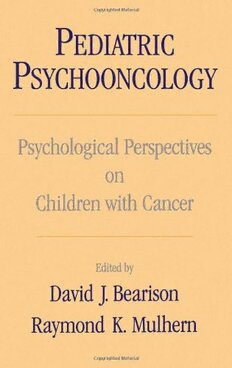
Pediatric Psychooncology: Psychological Perspectives on Children with Cancer PDF
264 Pages·1994·16.093 MB·English
Most books are stored in the elastic cloud where traffic is expensive. For this reason, we have a limit on daily download.
Preview Pediatric Psychooncology: Psychological Perspectives on Children with Cancer
Description:
Twenty to thirty years ago, the prognosis for children with cancer was dismal. Since then, remarkable advances in the treatment of childhood cancers have resulted in overall cure rates of 60 percent. In response to these improved prognoses, psychological frontiers of patient care and clinical research have evolved. Psychologists as well as mental health professionals from other disciplines are now routinely included in medical treatment planning and patient care. Psychosocial interventions with pediatric cancer patients and their families are guided by an increasingly sophisticated body of research findings that enhance their quality of life. With contributions from nationally recognized clinicians and researchers, this volume addresses the wide range of psychological issues inherent in pediatric oncology, including coping with pediatric cancer, pain and symptom management, medication compliance, neuropsychological effects of disease and therapy, sibling and family relations, bereavement, and care of the dying child. Each author carefully defines his or her research area, discusses theoretical and methodological concerns, critically reviews and integrates research findings, and discusses unresolved issues as well as future directions for research. This balanced and comprehensive overview of pediatric psychooncology is essential reading for all those interested in the treatment of children diagnosed with cancer.
See more
The list of books you might like
Most books are stored in the elastic cloud where traffic is expensive. For this reason, we have a limit on daily download.
